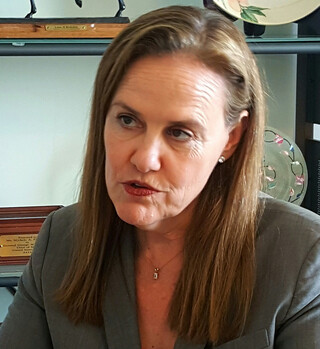hankyoreh
Links to other country sites 다른 나라 사이트 링크
Hillary’s campaign team signals hardline stance on North Korea

Hillary Clinton’s campaign team has been making a number of hawkish comments on the North Korean issue and other aspects of American policy toward North Korea. Some analysts predict that the tension under the Obama administration would continue, at least in the short term, if Clinton is elected president.
“I don’t think we should go back to the table without some very clear signals from North Korea that they are reducing their provocations and they are willing to at least implement their previous promises on constraining their nuclear arsenal,” said Michele Flournoy, co-founder and CEO of the Center for a New American Security (CNAS), during an interview with Yonhap News on Oct. 13. Flournoy is regarded as a likely Defense Secretary in a Clinton administration.
Flournoy served as Under Secretary of Defense for Policy during Obama’s first term in office, and she founded CNAS along with Kurt Campbell, former Assistant Secretary of State for East Asian and Pacific Affairs.
“I think the only way you‘re going to get them to consider [genuine denuclearization] is through additional sanctions, particularly [. . .] sanctions that involve pressure from China,” Flournoy said. She said that the US would negotiate when North Korea was ready to engage in serious negotiations, but that the North could only be prompted to do so through sanctions. She doubts that North Korea will be willing to negotiate without much stronger sanctions.
“They have to demonstrate their seriousness in some way, whether it’s stopping these provocations and/or taking some of the steps that they’ve promised in the past to show that they’re curtailing their nuclear weapons activities,” she added. Flournoy explained that tougher sanctions could include the power supply and transactions involving goods and services at North Korea’s border with China.
During a meeting with South Korean foreign correspondents in New York on Oct. 14, Mira Rapp-Hooper said that the UN and the US would continue to put tough sanctions on North Korea. Rapp-Hooper is a senior fellow with the Asia-Pacific Security Program at CNAS as well as coordinator of an Asia policy working group for the Hillary campaign.
“We will consider do all of these things, including using a ‘secondary boycott’ to put sanctions on Chinese companies that are illegally trading with North Korea in order to force China to cooperate, as well as strengthening trilateral security cooperation with South Korea and Japan, deploying THAAD and improving our missile defense system,” Rapp-Hooper said.
Other figures who are directly or indirectly involved with foreign policy for the Clinton campaign - including Kurt Campbell and Wendy Sherman, former US Under Secretary of State for Political Affairs - have recently gone on the record making harsh remarks.
This tendency stands in stark opposition to the calls for engaging in talks before North Korea further strengthens its nuclear and missile capabilities made by advocates of dialogue such as former US Secretary of Defense William Perry and Jane Harman, director of the Wilson Center.
There are concerns that if Clinton comes to power and continues to put harsh sanctions on North Korea and pressure on China to implement those sanctions, there would be a greater likelihood of further backlash from North Korea and chillier relations between the US and China, which could increase instability in Northeast Asia.
By Yi Yong-in, Washington correspondent
Please direct questions or comments to [english@hani.co.kr]

Editorial・opinion
![[Column] Park Geun-hye déjà vu in Yoon Suk-yeol [Column] Park Geun-hye déjà vu in Yoon Suk-yeol](https://flexible.img.hani.co.kr/flexible/normal/500/300/imgdb/original/2024/0424/651713945113788.jpg) [Column] Park Geun-hye déjà vu in Yoon Suk-yeol
[Column] Park Geun-hye déjà vu in Yoon Suk-yeol![[Editorial] New weight of N. Korea’s nuclear threats makes dialogue all the more urgent [Editorial] New weight of N. Korea’s nuclear threats makes dialogue all the more urgent](https://flexible.img.hani.co.kr/flexible/normal/500/300/imgdb/original/2024/0424/7317139454662664.jpg) [Editorial] New weight of N. Korea’s nuclear threats makes dialogue all the more urgent
[Editorial] New weight of N. Korea’s nuclear threats makes dialogue all the more urgent- [Guest essay] The real reason Korea’s new right wants to dub Rhee a founding father
- [Column] ‘Choson’: Is it time we start referring to N. Korea in its own terms?
- [Editorial] Japan’s rewriting of history with Korea has gone too far
- [Column] The president’s questionable capacity for dialogue
- [Column] Are chaebol firms just pizza pies for families to divvy up as they please?
- [Column] Has Korea, too, crossed the Rubicon on China?
- [Correspondent’s column] In Japan’s alliance with US, echoes of its past alliances with UK
- [Editorial] Does Yoon think the Korean public is wrong?
Most viewed articles
- 1‘We must say no’: Seoul defense chief on Korean, USFK involvement in hypothetical Taiwan crisis
- 2Will NewJeans end up collateral damage in internal feud at K-pop juggernaut Hybe?
- 3[Column] Park Geun-hye déjà vu in Yoon Suk-yeol
- 4Why Korea shouldn’t welcome Japan’s newly beefed up defense cooperation with US
- 5Thursday to mark start of resignations by senior doctors amid standoff with government
- 6N. Korean hackers breached 10 defense contractors in South for months, police say
- 7[Guest essay] The real reason Korea’s new right wants to dub Rhee a founding father
- 8[Column] ‘Choson’: Is it time we start referring to N. Korea in its own terms?
- 9Kim Jong-un expressed ‘satisfaction’ with nuclear counterstrike drill directed at South
- 10[Editorial] New weight of N. Korea’s nuclear threats makes dialogue all the more urgent